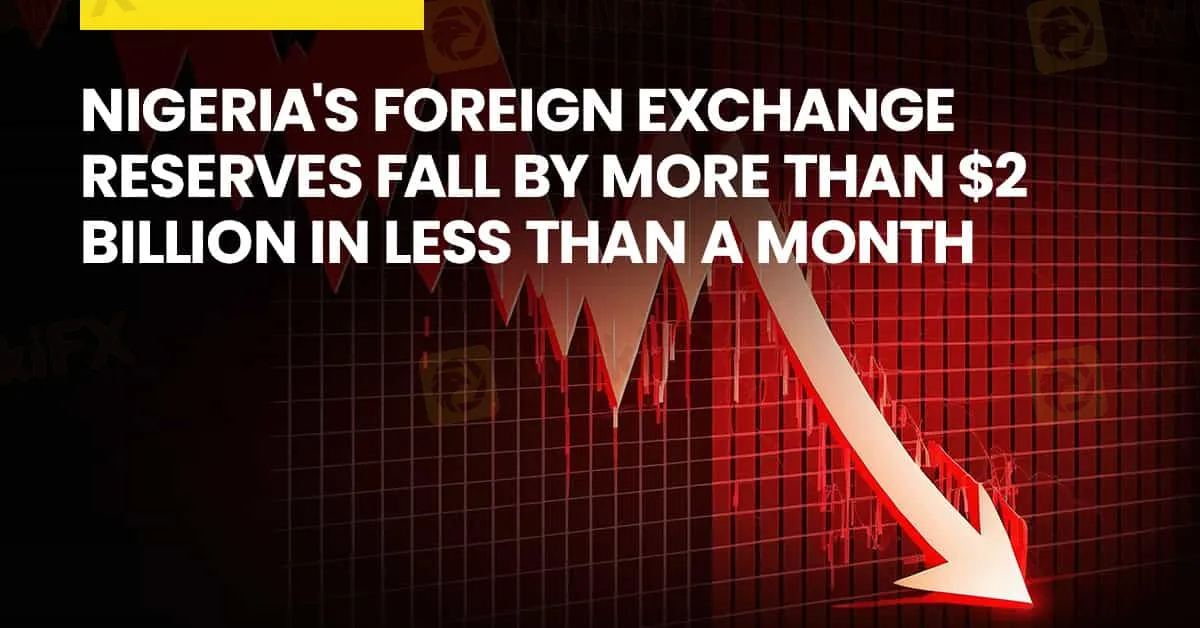简体中文
繁體中文
English
Pусский
日本語
ภาษาไทย
Tiếng Việt
Bahasa Indonesia
Español
हिन्दी
Filippiiniläinen
Français
Deutsch
Português
Türkçe
한국어
العربية
NIGERIA'S FOREIGN EXCHANGE RESERVES FALL BY MORE THAN $2 BILLION IN LESS THAN A MONTH
Abstract:Nigeria's FX reserves have experienced a notable decline of almost $2.16 billion during a period of 29 days, despite the Central Bank of Nigeria's (CBN) vigorous attempts to stabilize the value of the naira. As of April 15, 2024, the CBN's current estimates show that the FX reserves are at $32.29 billion, from $34.45 billion on March 18, 2024.

Nigeria's FX reserves have experienced a notable decline of almost $2.16 billion during a period of 29 days, despite the Central Bank of Nigeria's (CBN) vigorous attempts to stabilize the value of the naira. As of April 15, 2024, the CBN's current estimates show that the FX reserves are at $32.29 billion, from $34.45 billion on March 18, 2024.
Previous reports indicated that the CBN's aggressive operations in the FX market to boost the naira resulted in a significant depletion of reserves, losing almost $1.02 billion.
This ongoing pattern emphasizes the ongoing challenges to Nigeria's currency and the proactive steps taken by the central bank to control market dynamics and support economic stability.
LEAST RESERVES IN MORE THAN HALF A DECADE
Nigeria's FX reserves have fallen to their lowest point since $32.28 billion on September 25, 2017.
The reserves experienced a 43-day increase, accruing $1.28 billion between February 5, and March 18, 2024, before finally reaching their lowest level in six years and six months. Prior to this, the CBN blamed the increase on rising remittance payments from Nigerians living overseas and growing interest in debt instruments, by international investors. The increase was attributed, among other things, to increased oil production and modifications made to the foreign exchange market, according to the apex bank, losing almost $2.16 billion between March 18, 2024, when they reached a high of $34.45 billion, and April 15, 2024, when they reached a critical low of $32.29 billion. The amount was $33.57 billion at the beginning of the month and decreased over time, hitting $33.43 billion by April 4. With the amounts at $33.04 billion on April 8, $32.61 billion on April 12, and $32.29 billion on April 15, the decline of reserves continued.
This declining trend highlights the ongoing financial hardship experienced by the central bank as it works to keep the value of the naira stable in the face of difficult economic circumstances.
PROBABLY CAUSES OF RESERVE DEPLETION
· Increasing FX Interventions by Central Banks: With the intention of stabilizing the naira, the CBN has stepped up a number of FX windows. This involves actively selling dollars, which lowers the total amount of reserves. Even while these interventions control the value of the currency, they quickly deplete reserves.
· Debt and Financial Obligations: Nigeria must pay off a sizable amount of its external debt, for Eurobonds and other foreign financial obligations. Foreign currency are needed to service these obligations, further depleting the reserves. Although updated statistics for Q1 2024 regarding Nigeria's external debt servicing is not yet available, between January and October 2023, half of its dollar payments for external debt servicing, highlighting the mounting impact of foreign debt on the country's economy. Additionally, Nigeria's January 2024 external debt servicing expenditures reached $560 million, a 339% increase over the $112 million spent the year before.
· Low Oil output and Revenue: Nigeria has been struggling with low oil output, which is mostly the result of vandalism, theft of oil, and infrastructure problems. Furthermore, the policies and circumstances affecting the world economy and oil prices have an impact. Nigeria has not been able to profit from the high global oil prices because of its decreased production capability. According to data from the Petroleum Exporting Countries' most recent monthly oil market report, Nigeria's crude oil production decreased for the second time this year, from 1.32 million barrels per day in February to 1.23 million barrels per day in March (OPEC). According to the latest figures, Libya produced somewhat more barrels per day (around 1.24% more) in March than Nigeria. Sen. Heineken Lokpobiri, the state minister in charge of petroleum resources, recently explained that problems with the Trans-Niger pipeline and some oil companies' maintenance efforts were to blame for the low output of crude oil in the first quarter of the year.
WHAT YOU MUST UNDERSTAND
· Significant drops in reserves have the potential to undermine investor confidence and result in a downgrading of the country's credit rating, which would raise borrowing costs. Nigeria's national bond credit rating is already considered inadequate, according to the World Bank.
· A further depreciation of the naira could result from the CBN's limited ability to act in the currency market as a result of the decline in reserves.
· According to a recent forecast by the International Monetary Fund (IMF), Nigeria's foreign reserves are predicted to significantly decline, reaching just $24 billion by 2024. These difficulties will be made worse by the lack of fresh Eurobond issuances, large repayments of current funds and Eurobonds totaling $3.5 billion, and ongoing portfolio outflows. On the other hand, given in portfolio inflows, it predicted a positive rebound to $38 billion by 2028.

Disclaimer:
The views in this article only represent the author's personal views, and do not constitute investment advice on this platform. This platform does not guarantee the accuracy, completeness and timeliness of the information in the article, and will not be liable for any loss caused by the use of or reliance on the information in the article.
Read more

E TRADE Review: Traders Report Tax on Withdrawals, Poor Customer Service & Fund Scams
Has your E Trade forex trading account been charged a withholding tax fee? Did your account get blocked because of multiple deposits? Did you have to constantly call the officials to unblock your account? Failed to open a premium savings account despite submitting multiple documents? Is fund transfer too much of a hassle at E Trade? Did you find the E Trade customer support service not helpful? In this E Trade review article, we have shared certain complaints. Take a look!

mBank Exposed: Top Reasons Why Customers are Giving Thumbs Down to This Bank
Do you find mBank services too slow or unresponsive? Do you find your account getting blocked? Failing to access your account online due to several systemic glitches? Can’t perform the transactions on the mBank app? Do you also witness inappropriate stop-level trade execution by the financial services provider? You are not alone! Frustrated by these unfortunate circumstances, many of its clients have shared negative mBank reviews online. In this article, we have shared some of the reviews. Read on!

In-Depth Uniglobe Markets Commission Fees and Spreads Analysis – What Traders Should Really Know
For experienced traders, the cost of execution is a critical factor in broker selection. Low spreads, fair commissions, and transparent pricing can be the difference between a profitable and a losing strategy over the long term. This has led many to scrutinize the offerings of brokers like Uniglobe Markets, which presents a tiered account structure promising competitive conditions. However, a professional evaluation demands more than a surface-level look at marketing claims. It requires a deep, data-driven analysis of the real trading costs, set against the backdrop of the broker's operational integrity and safety. This comprehensive Uniglobe Markets commission fees and spreads analysis will deconstruct the broker's pricing model, examining its account types, typical spreads, commission policies, and potential ancillary costs. Using data primarily sourced from the global broker inquiry platform WikiFX, we will provide a clear-eyed view of the Uniglobe Markets spreads commissions prici

In-Depth Review of Stonefort Securities Regulation and Oversight – A Trader's Guide to the Risks
For experienced traders, the process of selecting a new broker transcends a simple comparison of spreads and leverage. It is a meticulous due diligence exercise where the integrity of the broker's regulatory framework is paramount. Stonefort Securities, a relatively new entrant in the crowded brokerage space, presents a complex and often contradictory profile. On one hand, it boasts a modern MT5 platform and a stream of positive user testimonials. On the other hand, it is shadowed by severe regulatory warnings that question the very foundation of its operations. This in-depth review focuses on the core issue for any long-term trader: Stonefort Securities regulation and oversight. We will dissect the broker's corporate structure, scrutinize its licensing claims, and analyze what the data implies for trader protection and fund security. For traders evaluating whether Stonefort Securities is a trustworthy partner, understanding these details is not just important—it is essential.
WikiFX Broker
Latest News
In-Depth Uniglobe Markets Commission Fees and Spreads Analysis – What Traders Should Really Know
WikiFX's New Evaluation of ATM Capital LTD: Does its License Protect the Arab Investor?
Is Axi Legit? A Data-Driven Analysis of Its Regulatory Standing and Trader Feedback
How a Fake Moomoo Ad Led to the “New Dream Voyage 5” Scam
FXPesa Review: Are Traders Facing High Slippage, Fund Losses & Withdrawal Denials?
Trive Investigation: High Score, Hidden Risk - The Profit Paradox
Bessent believes there won't be a recession in 2026 but says some sectors are challenged
Is GGCC Legit? A Data-Driven Analysis for Experienced Traders
Young Singaporean Trader Grew USD 52 into a USD 107,700 Portfolio
mBank Exposed: Top Reasons Why Customers are Giving Thumbs Down to This Bank
Currency Calculator



